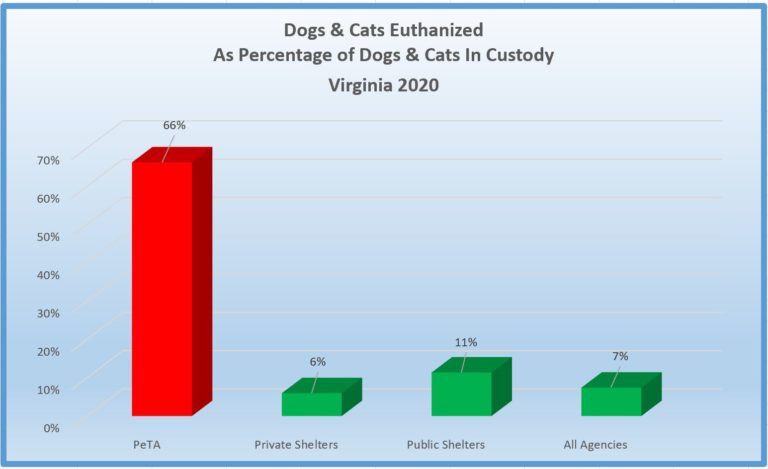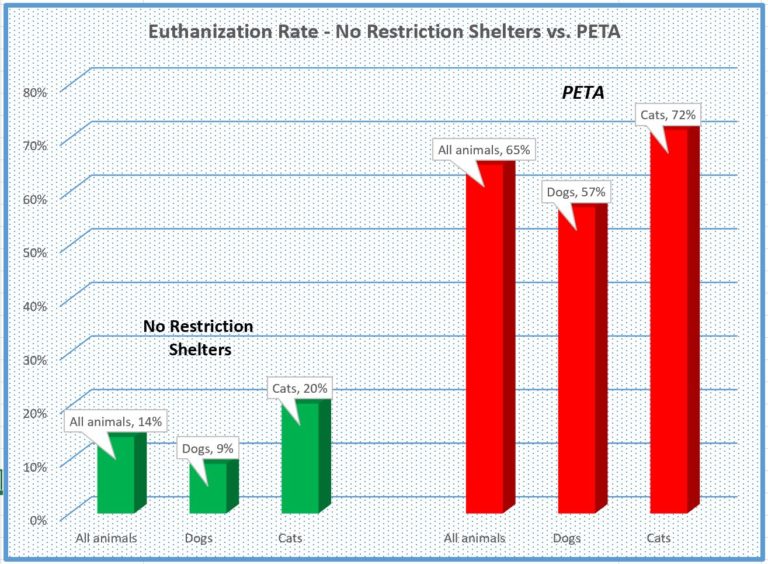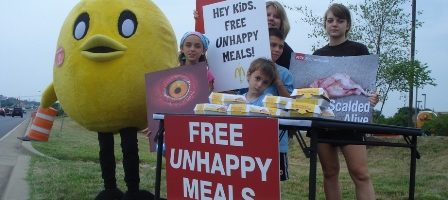PETA is widely known in the media for their controversial methods of animal activism. Overall, their actions range from silly to insensitive to downright dangerous.
PETA’s Euthanasia Rates
PETA stands for People for the Ethical Treatment of Animals[2]. While this is what they preach, it is not always what they practice. Every year, animal shelters in the Commonwealth of Virginia are required to submit a summary of the animals they took into custody, the animals they euthanized, and the animals they found homes for. In PETA’s 2020 report, it is shown that they euthanize 66% of all animals (cats and dogs) that are taken into their shelter. Public shelters in Virginia report a euthanasia rate of 11% on average, while private shelters have a rate of 6%. The difference in rates is ridiculous, especially as PETA claims that their goal is to help animals [25].

In response to criticism regarding their high euthanasia rate, PETA claimed that this was due to them being a no restriction shelter. What is a no restriction shelter? Also referred to as open admission shelters, they are shelters that will take in any animals, regardless of their health. Due to this, they have a higher than average euthanasia rate, as many of the animals are extremely ill and not suitable for adoption. PETA’s president Ingrid Newkirk claims that a “majority of adoptable dogs” never even enter their shelters, as they refer them to other local adoption agencies. She has also said that, for most of their animals, they find them homes or “put [them] out of their misery” as they “come from abysmal conditions” [31]. While these claims can account for the fact that their euthanasia rates are higher than average, it still does not make their rates acceptable. The average euthanasia rate for open admission shelters in Virginia is 14%. PETA’s is 65%. This is more than 4 times greater [26]. There should be no reason for their rate to be so much higher than that of similar shelters.

There have also been situations where PETA employees obtain and euthanize animals that are in no need of “rescuing”. In 2014, there was a case where two employees took a chihuahua, Maya, off of a porch. They put Maya down the next day. According to MSU’s Animal Legal & Historical Center, most states have a grace period ranging from 3-10 days in which the animal cannot be put up for adoption or euthanized. In Virginia, this grace period is 5 days. PETA’s employees violated this law by putting Maya down so soon after illegally obtaining her [19].
Shock Tactics: Acceptable or Just Insensitive?
With the growth of social media, it can be more difficult to be seen under all of the noise. Shock tactics are used by many corporations and organizations to garner attention, as they give them the “ability to magnetize or deter the public”. By using media to their advantage, PETA has an “immense power to direct the attention of outsiders,” according to Jonathan Matusitz and Maya Forrester[10]. PETA’s promotion tactics are commonly unpleasant and outrageous. They perform public protests where they expose the gory procedures involved in many aspects of commercial animal farms and industries. While it is important to draw attention to these injustices, the methods that PETA use can be extremely offensive to many groups, such as children, African Americans, and those impacted by the Holocaust.
The Unhappy Meal
In 2009, PETA had a campaign targeting McDonald’s and their unethical treatment of chickens. According to PETA, McDonald’s sells “packages of abused and bruised chicken” which always ensure and “unhealthy, unhappy meal”[32]. PETA’s goal in this protest was to “alert young and old alike to the suffering” that takes place when creating a Happy Meal at McDonald’s[29]. While raising awareness is beneficial, targeting children with gory imagery is not the way to go about this task. It will only raise fear within them.

According to the LA Times, “Unhappy Meals” were handed out, each of with contained a rubber chicken stained with fake blood and a sticker depicting Ronald McDonald, the company’s mascot, “wielding a bloody knife”. Many parents expressed how this campaign was “not fair” for children[3].

In an interview with the LA Times, PETA said that their main goal with this campaign was to influence McDonald’s to change the methods of killing chickens, not to eliminate the use of meat within the company. According to PETA, the method used by McDonald’s, electric immobilization, is unethical, as the electricity used to “immobilize them isn’t enough to render them insensible to pain”. They have provided suggestions to switch to controlled-atmosphere stunning, where the oxygen in a habitat is depleted, which they claim is “less cruel and eliminates physical pain for the birds.”[3]
Your Mommy Kills Animals
In 2003, PETA hosted a campaign out of a New York City showing of The Nutcracker where they handed out pamphlets to young children. They targeted specific children, however, as they looked for mothers wearing fur. While Lisa Franzetta, the coordinator, claims that the pamphlets were actually targeted at the mothers, but professionals still condemned the campaign. According the Dr. Jeffrey Dolgan, the chief of psychology at Denver’s Children’s Hospital, these implications in these pamphlets are “beyond insensitive” and that it could be “anxiety-arousing”[21].

To further show the disconnect between PETA and the community, a PETA employee stated that they “don’t anticipate any controversy” when referring the the campaign[11].
The Holocaust on Your Plate and We Are All Animals
In 2003, PETA launched an infamous campaign called “The Holocaust on Your Plate”. In her article “Moral Extensionism or Racist Exploitation? The Use of Holocaust and Slavery Analogies in the Animal Liberation Movement”, Claire Jean Kim, a human-animal studies and race studies researcher, analyses the comparison of animals to slaves and Holocaust victims. In the campaign, there were panels that compared “a picture of human suffering in the Holocaust… with a picture of animal suffering in modern farming”. The chairman of the US Holocaust Memorial Museum called this display “a desecration of Holocaust memory,” while others described it as “shocking, malicious, and repulsive.”[8]
In 2005, PETA launched a similar campaign titled “We Are All Animals”. Instead of comparing Holocaust victims to farm animals, “images of the suffering of slaves, Native Americans, suffragettes and other historically subordinated human groups” were compared to animals suffering. The response to this campaign was similar to responses regarding “The Holocaust on Your Plate”[8].
Comparing the victims of the Holocaust to animals has been a sensitive topic throughout history. According to Kim, Jews and African Americans alike have “historically been constructed as liminal figures standing at the boundary between humanness and animalness precisely in order to justify their enslavement or extermination.”[8] It is extremely insensitive and disgusting to make these comparisons in the modern day, as they are the exact comparisons used to demoralize and encourage hate towards these minority groups in the past.
PETA’s Attack on Individuals
PETA, while known for large scale campaigns against corporations or large groups, have also led protests against individuals. in 2017, PETA targeted Christine Lattin, a researcher at Yale, for her studies on house sparrows. PETA supporters tormented Lattin by sending her emails and messages saying “You should kill yourself, you sick bitch!” and “I hope someone throws you into the fire.” These threats arose after PETA stated that Lattin was performing unethical research on birds. Lattin’s research was on “how stress affects hormones, neurotransmitters, and other aspects of physiology in living bird,” according to David Grimm in an article on Science Magazine[6].
While Katy Guillermo, the vice president for PETA, claims that the focus of the protest was Yale, the actions of PETA and their supporters contradict this claim. PETA organized a protest outside of Lattin’s house and “shared her home address with its supporters,” according to Grimm. In an interview, Lattin stated that “some of the threats were so specific that she was told to forward them to the police.” She began having trouble sleeping due to dears “about her husband and young child.” While Guillermo has stated that she does not support some of the wording of these hateful messages, she still supports the cause[6].
“Some of the threats were so specific that she was told to forward them to the police… she [worried] about her husband and young child.”
David Grimm, Science Magazine
A Look at PETA’s Twitter
A lot of PETA’s presence in the media comes from their Twitter account, where they are very active. Their tweets usually range from supporting brands that are cruelty free to calling attention to issues they see regarding animal rights. While some of their tweets can seem very silly, some show a lack of research by the organization while others are extremely manipulative.
Anti-Animal Language
In December of 2018, PETA made a tweet regarding the use of anti-animal language in common English idioms. The idioms they called out include “kill two birds with one stone” as well as “bring home the bacon”. They made suggestions about how to fix these idioms by replacing the “speciesism”. Instead of “kill two birds with one stone”, they suggest that you instead “feed two birds with one scone”[18].
While there is nothing inherently wrong with their desire to fix these idioms, there is also nothing wrong with the phrases as they are. The main issue with this “campaign” is the fact that PETA compares the use of these idioms to “racist, homophobic, or ableist language”, as they trivialize animal cruelty.
One Twitter user responded to this tweet by mentioning how scones are actually bad for the health of bird[24].
According to an article by Ken Smith on The Herald Scotland, it is in fact bad to feed birds scones, as said by ecologist Rich Lewis[27].
In PETA’s tweet, they also encourage the feeding of a fed horse. This can be seen as overfeeding, or maybe even force feeding, which PETA has shown their opposition to. In April, 2021, PETA made a tweet informing people of the legality of foie gras in Brazil. Foie gras is a dish made from the liver of ducks and geese[16]. In order to make the dish “better” the ducks and geese are force fed to the point where they can no longer move. I agree with PETA that foie gras is an inhumane dish and should be banned, but it is odd that they would also encourage the overfeeding of a horse.
Misinformation
Johns Hopkins University
In a tweet made in April, 2021, PETA claims that research being done at Johns Hopkins University is unconstitutional[13]. In this tweet, they make two major claims, neither of which are accurate. They make these claims in order to make a third claim that draws on their first two.
There are many things to break down within this tweet, so I am going to start with the first claim that he US Constitution prohibits congressionally impose death sentences. Within the US Constitution, there is no mention of congressionally imposed death sentences. The Constitution does not prohibit the death sentence at all. According to the Death Penalty Information Center, the death penalty is not prohibited as the “Eight Amendment contained an ‘evolving standard of decency that marked the process of a maturing society'”[4].
The second claim references the Helms Amendment. While this claim is not necessarily wrong, it is very confusing and requires a lot of digging on the internet to figure out what PETA is talking about. To get a better understanding of the situation, I first looked up the Helms Amendment. What I found was an amendment made by Jesse Helms to the Foreign Assistance Act of 1961, which prohibits foreign funds from promotion or assisting in abortions[12]. This is definitely not the amendment PETA was referring to. I then looked up the 2002 Helms Amendment. I was met with the same information. With more digging, I found that PETA was referring to the 2002 Farm Bill, which excluded rats, mice, and birds from the Animal Welfare Act[22]. While both changes were pushed for by Helms, the latter is not referred to as the Helms Amendment. This lack of clarity will certainly result in confusion among those who are interested in the information being presented by PETA. If they are not willing to correctly address information in this tweet, what is to say that their other tweets are not misleading.
Finally regarding this tweet, is the third claim, that the studies occurring at JHU are unconstitutional. This just is not correct. As stated previously, birds are not included in the Animal Welfare Act. The prohibition of the death penalty, while nonexistent, would not apply to birds. In the preamble of the Constitution, it is stated that it was written to protect “ourselves and our Posterity,” posterity meaning future generations[28]. Nowhere does it include animals. This also is not a case that even includes the death penalty, as that is a punishment applied to someone who commits a crime. I doubt these owls are hardened criminals.
April the Giraffe
Also in April, 2021, PETA showed their condolences for the loss of April the Giraffe. In their tweet, they used April’s death as a way to call out the mistreatment of animals in situations such a April’s[17].
Many people took to the replies to show their disagreement with PETA about this “issue”. Many users called out the misinformation being spread concerning her treatment at Animal Adventure Park.
As stated in these tweets, April was treated very well and lived a better life than she would have in the wild. PETA claimed that she was a “breeding machine” is also inaccurate, as it is not uncommon for giraffes to have offspring more than once, as they “first breed at four or five years old” according to Britannica[7].
Manipulation
Many of PETA’s tweets have the clear intention of manipulating their audience through the use of fallacies. Their most common fallacy is the “False-Dilemma Fallacy”, which used to mislead viewers by presenting them with two opposing sides, both of which are made out to be the only possible options. This is problematic because it does not present the option for compromise, according to Karla Cook. They also use Hasty Generalization, which is when someone presents information without sufficient evidence to make the claim[5].
False-Dilemma Fallacy
In a tweet regarding industrialized fishing, PETA created a poll that asked users if they would rather save humans and the planet or kill aquatic wildlife[14].
This is a false-dilemma fallacy because it claims that the only options are to kill aquatic life, consequently killing the planet, or to stop fishing. They do not suggest the use of better methods of sustainability, and instead strive to create guilt within the reader.
In a similar tweet, a PETA supporter claims that the only ethical thing to do is stop eating fish[30]. This claim is made while supporting PETA’s newest documentary, Seaspiracy, which looks at how corporate fishing negatively impacts the oceans[1].
This is a false-dilemma because there are obviously other ways to be ethical, many of which have nothing to do with fishing at all. If you look at this in a narrower perspective and only consider eating fish, it is also ethical to support local fisheries that practice sustainable methods.
Hasty Generalization Fallacy
In another tweet regarding their documentary, PETA claims that “[if] you still eat fish, you’re likely supporting organized crime”[15].
This is a hasty-generalization because PETA does not have adequate information to claim where the food on any individual’s plate comes from.
Is PETA Really That Bad?
After analyzing the above information, I personally believe that it is safe to say that PETA does not help animals as much as they claim they do. Their actions completely undermine their ideals of showing the world the cruelty that animals face. Due to their past, and their current actions, it is difficult for people to see them as more than a hypocritical, extremist organization. They have to rely on shock tactics in order to remain relevant in the modern day, as that is what they built themselves on. They also find themselves relying on manipulation tactics in order to get people to listen to them.
Works Cited
[1] “6 Things You’ll Learn From Netflix’s ‘Seaspiracy.’” PETA, 6 Apr. 2021, https://www.peta.org/features/important-takeaways-from-netflix-documentary-seaspiracy/.
[2] “About PETA.” PETA, https://www.peta.org/about-peta/. Accessed 25 Apr. 2021.
[3] Barnett, Lindsay. “PETA Pushes for Slaughter Reforms, Ruffles Feathers by Passing out ‘Unhappy Meals’ to McDonald’s Customers.” LA Times Blogs, 11 Aug. 2009, https://latimesblogs.latimes.com/unleashed/2009/08/peta-mcdonalds-unhappy-meal.html.
[4] “Constitutionality of the Death Penalty in America.” Death Penalty Information Center, https://deathpenaltyinfo.org/facts-and-research/history-of-the-death-penalty/constitutionality-of-the-death-penalty-in-america. Accessed 25 Apr. 2021.
[5] Cook, Karla. 15 Common Logical Fallacies and How to Spot Them. https://blog.hubspot.com/marketing/common-logical-fallacies. Accessed 25 Apr. 2021.
[6] Grimm, David. “PETA versus the Postdoc: Animal Rights Group Targets Young Researcher for First Time.” Science | AAAS, 8 Sept. 2017, https://www.sciencemag.org/news/2017/09/peta-versus-postdoc-animal-rights-group-targets-young-researcher-first-time.
[7] Herbison, Lory, and George W. Frame. “Giraffe | Facts, Information, Habitat, & Lifespan.” Encyclopedia Britannica, https://www.britannica.com/animal/giraffe. Accessed 25 Apr. 2021.
[8] Kim, Claire Jean. “Moral Extensionism or Racist Exploitation? The Use of Holocaust and Slavery Analogies in the Animal Liberation Movement.” New Political Science, vol. 33, no. 3, Sept. 2011, pp. 311–33. DOI.org (Crossref), doi:10.1080/07393148.2011.592021.
[9] @Lora1069 (Lora A). “She has 2 babies….not quite a breeding machine and was only at AAP for 5 years….they took fantastic care of her she should not be released into the wild.” Twitter, 2 Apr. 2021, 8:59 p.m., https://twitter.com/Lora1069/status/1378150094596403200?s=20
[10] Matusitz, Jonathan, and Maya Forrester. “PETA Making Social Noise: A Perspective on Shock Advertising.” Portuguese Journal of Social Science, vol. 12, no. 1, Mar. 2013, pp. 85–100. DOI.org (Crossref), doi:10.1386/pjss.12.1.85_1.
[11] “Mommy Kills Animals, Take 2.” PETA, 20 June 2007, https://www.peta.org/blog/mommy-kills-animals-take-2/.
[12] Oas, Rebecca. “What Is the Real Purpose of the Helms Amendment to the Foreign Assistance Act?” C-Fam, https://c-fam.org/definitions/what-is-the-real-purpose-of-the-helms-amendment-to-the-foreign-assistance-act/. Accessed 25 Apr. 2021.
[13] @peta (PETA). “A clause in the U.S. Constitution prohibits congressionally imposed death sentences & other punishment. But the owls experimented on at @JohnsHopkins will ultimately be tortured & killed because of the Helms Amendment. Therefore, what #JHU is doing to owls is unconstitutional.” Twitter, 8 Apr. 2021, 5:07 p.m., https://twitter.com/peta/status/1380266189771837440?s=20
[14] @peta (PETA). “By propping up the fishing industry, governments are subsidizing the problem and not the solution. Would you rather save humans from hunger than kill aquatic wildlife and destroy the planet?” Twitter, 1 Apr. 2021, 9:54 p.m., https://twitter.com/peta/status/1377801850100015104?s=20
[15] @peta (PETA). “If you still eat fish, you’re likely supporting organized crime. The fish on your plate wasn’t just an individual who wanted to life – their dead bodies could actually be contraband. #Seaspiracy” Twitter, 1 Apr. 2021, 9:55 p.m., https://twitter.com/peta/status/1377801850100015104?s=20
[16] @peta (PETA). “This decision will mean life or death for ducks & geese. #Brazil’s Supreme Court is ruling on São Paulo’s ban on selling & producing foie gras—a cruel dish made by ramming pipes down birds’ throats & force-feeding them. RETWEET if you want the ban to be reinstated!” Twitter, 5 Apr. 2021, 4:04 p.m., https://twitter.com/peta/status/1379162941535182850
[17] @peta (PETA). “Rip April [heart emoji] @AnimalAdvPark treated her like a breeding machine for years & exploited her most vulnerable moments by livestreaming her births. Wild animals belong in their natural habitats, not trapped at roadside zoos & used for likes on social media. peta.vg/33ai” Twitter, 2 Apr. 2021, 8:43 p.m., https://twitter.com/peta/status/1378145989010329601
[18] @peta (PETA). “Words matter, and as our understanding of social justice evolves, our language evolves along with it. Here’s how to remove speciesism from your daily conversation.” Twitter, 4 Dec. 2018, 4:23 p.m., https://twitter.com/peta/status/1070066205170397184?s=20
[19] “Peta Says Sorry for Taking Girl’s Pet Chihuahua and Putting It Down.” The Guardian, 17 Aug. 2017, http://www.theguardian.com/us-news/2017/aug/17/peta-sorry-for-taking-girls-dog-putting-it-down.
[20] @politicalchicky. “I support you in many other avenues but I don’t agree w/ this tweet. She wasn’t hunted by lions, or endure drought or hunger. She survived twice as long as was typical in the wild. She was provided excellent care. Nothing is perfect but hers was a pretty good life.” Twitter, 2 Apr. 2021, 9:02 p.m., https://twitter.com/politicalchicky/status/1378150903593713668?s=20
[21] Post, Denver. “Anti-Fur Effort Goes for Shock Value.” Chicago Tribune, https://www.chicagotribune.com/news/ct-xpm-2003-12-22-0312220087-story.html. Accessed 25 Apr. 2021.
[22] “Rats, Mice and Birds Excluded from Animal Welfare Act.” American Psychology Association, https://www.apa.org/monitor/julaug02/rats. Accessed 25 Apr. 2021.
[23] Rosen, Jill. “Owls Help JHU Scientists Unlock the Secret of How the Brain Pays Attention.” The Hub, John Hopkins University, 30 Oct. 2018, https://hub.jhu.edu/2018/10/30/barn-owls-brain-study/.
[24] @ShayTheyDrag (Shay) “Scones are literally bad for birds… so even the proposed phrases cause harm to animals. [Crying emoji]” Twitter, 20 Apr. 2021, 9:11 a.m., https://twitter.com/ShayTheyDrag/status/1384494910611542019?s=20
[25] Simpson, John M. “Euthanasia At PETA’s ‘Shelter’ Still Occurring At Alarming Rate – Animal Law Developments.” Animal Law Developments, Duane Morris, https://blogs.duanemorris.com/animallawdevelopments/2021/02/09/euthanasia-at-petas-shelter-still-occurring-at-alarming-rate/. Accessed 25 Apr. 2021.
[26] Simpson, John M. “PETA Offers Unconvincing Defense For The High Kill Rate In Its ‘Shelter’ – Animal Law Developments.” Animal Law Developments, Duane Morris, https://blogs.duanemorris.com/animallawdevelopments/2020/11/05/peta-offers-unconvincing-defense-for-the-high-kill-rate-in-its-shelter/. Accessed 25 Apr. 2021.
[27] Smith, Ken. “Herald Diary: Scones. Not Suitable for Birds.” The Herald Scotland, https://www.heraldscotland.com/opinion/17281975.herald-diary-scones-not-suitable-birds/. Accessed 25 Apr. 2021.
[28] “The U.S. Constitution: Preamble.” United States Courts, https://www.uscourts.gov/about-federal-courts/educational-resources/about-educational-outreach/activity-resources/us. Accessed 25 Apr. 2021.
[29] “Unhappy Meals Now at McDonalds, Courtesy of PETA.” PETA, 20 July 2009, https://www.peta.org/blog/unhappy-meals-now-mcdonalds-courtesy-peta/.
[30] @veganhippiesol (Dominique). “The only ethical thing to do is stop eating fish. #Seaspiracy” Twitter, 24 Mar. 2021, 4:46 p.m., https://twitter.com/veganhippiesol/status/1374824918844633088?s=20
[31] “Why We Euthanize.” PETA, 1 Feb. 2018, https://www.peta.org/blog/euthanasia/.
[32] “‘Win It’ Wednesday: ‘Unhappy Meals.’” PETA, 12 Aug. 2009, https://www.peta.org/blog/win-wednesday-unhappy-meals/.
